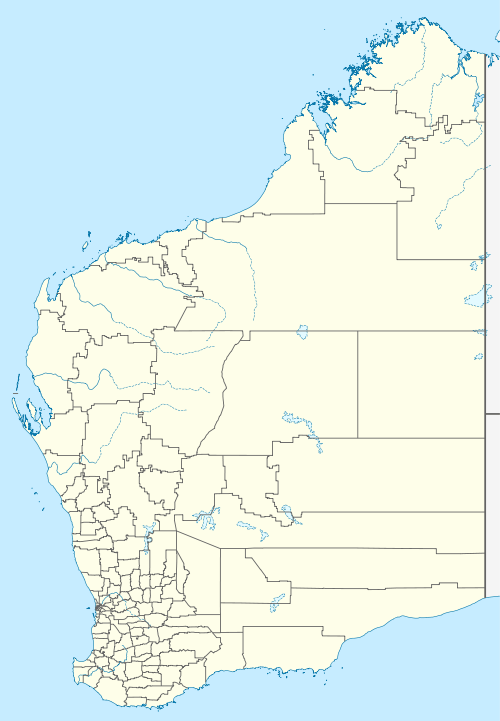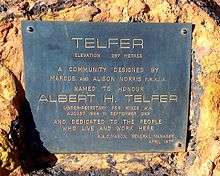Telfer, Western Australia
Telfer is a minesite in the Pilbara region of Western Australia, within the Great Sandy Desert. Telfer was previously the state's most isolated town, located 1,300 kilometres (808 mi) north-east of the state capital Perth.[3] The gold, copper and silver mine is run by Newcrest Mining, and is one of the largest gold mines in Australia.
| Telfer Western Australia | |||||||||
|---|---|---|---|---|---|---|---|---|---|
 Telfer | |||||||||
| Coordinates | 21°42′30″S 122°13′40″E | ||||||||
| Population | 464 (2006 census)[1] | ||||||||
| Postcode(s) | 6762 | ||||||||
| Elevation | 292 m (958 ft)[2] | ||||||||
| Location |
| ||||||||
| LGA(s) | Shire of East Pilbara | ||||||||
| State electorate(s) | Pilbara | ||||||||
| Federal Division(s) | Durack | ||||||||
| |||||||||
History
Newmont Mining first made a claim to the deposit in 1972;[4] however, this is disputed by Jean-Paul Turcaud to this date.[5][6]
The town of Telfer, non-existent until then, was built by Newmont in 1976 and named after A.H. Telfer, a former under secretary for mines in Western Australia. The town grew to a peak of almost 1,000 inhabitants in the early 1990s, with services like a supermarket, a police station, a bank, a community hall, a library and a number of sporting facilities being available.[7]

The mine opened in 1977 as a joint venture between BHP Billiton and Newmont Mining. In 1990, a merger between Newmont Australia Limited and BHP Gold Limited resulted in the creation of Newcrest Mining, with ownership of the Telfer Mine now lying with Newcrest.[8]
Telfer's demographic characteristics were typical of a northern Western Australian mining town in the time period. It had a male to female ratio of 2.4 to 1 and almost 40 percent of its population was born overseas. Half its population was below the age of 35 and the town experienced an annual population turnover of almost 20 percent.[7]
In 1996, the town suffered the decision to move the Telfer mine from residential to a fly-in fly-out workforce. Many of the commercial services were withdrawn; only the recreational facilities were maintained. The existing housing was now used for the accommodation of the mine's mobile work force. One of the main reasons for the town's closure was that fly-in fly-out rosters gave the mine access to a larger skilled work force and to people that would otherwise have been unwilling to relocate to a remote location like Telfer.[7]
Open-cut mining was suspended in August 2000 due to high operating costs. High production costs were primarily caused by the presence of cyanide soluble copper in the open pit ore.[8]
In 2002, Newcrest Mining announced a new redevelopment project worth $1 billion,[9] after discovering new mineral areas and a reserve base of some 591 tonnes (19 million troy ounces) of gold and 640 thousand tonnes (1.4 billion pounds) of copper.[10] The mine reopened in November 2004, after commissioning of the processing plant and, initially as an open cut mine, from March 2006 also with an underground operation.[8][11]
Climate
Telfer has a semi arid climate with extremely hot summers and warm winters. Summer highs average at 40 °C (104 °F) and winter highs at 25 °C (77 °F). It receives an average annual rainfall of approximately 370 millimetres (15 in), despite the fact that it lies relatively close to the Indian Ocean. This location leaves the community vulnerable to tropical cyclones. For example, Cyclone Graham affected the area in early 2003, delivering 163 millimetres (6.4 in) of rain. Severe Tropical Cyclone Laurence also passed over the mine site in December 2009.[12]
| Climate data for Telfer Aero | |||||||||||||
|---|---|---|---|---|---|---|---|---|---|---|---|---|---|
| Month | Jan | Feb | Mar | Apr | May | Jun | Jul | Aug | Sep | Oct | Nov | Dec | Year |
| Record high °C (°F) | 48.1 (118.6) |
47.1 (116.8) |
45.1 (113.2) |
41.2 (106.2) |
38.0 (100.4) |
33.9 (93.0) |
33.4 (92.1) |
36.0 (96.8) |
41.3 (106.3) |
44.1 (111.4) |
46.0 (114.8) |
47.9 (118.2) |
48.1 (118.6) |
| Average high °C (°F) | 40.4 (104.7) |
38.6 (101.5) |
37.4 (99.3) |
34.5 (94.1) |
29.0 (84.2) |
25.3 (77.5) |
25.3 (77.5) |
28.4 (83.1) |
32.9 (91.2) |
37.2 (99.0) |
39.4 (102.9) |
40.3 (104.5) |
34.1 (93.4) |
| Average low °C (°F) | 26.0 (78.8) |
25.4 (77.7) |
24.0 (75.2) |
20.6 (69.1) |
15.4 (59.7) |
11.9 (53.4) |
10.6 (51.1) |
12.5 (54.5) |
16.5 (61.7) |
21.0 (69.8) |
23.5 (74.3) |
25.5 (77.9) |
19.4 (66.9) |
| Record low °C (°F) | 17.2 (63.0) |
17.7 (63.9) |
14.4 (57.9) |
11.5 (52.7) |
5.6 (42.1) |
2.1 (35.8) |
3.0 (37.4) |
2.5 (36.5) |
6.2 (43.2) |
10.5 (50.9) |
13.0 (55.4) |
16.5 (61.7) |
2.1 (35.8) |
| Average precipitation mm (inches) | 53.2 (2.09) |
101.9 (4.01) |
74.5 (2.93) |
19.6 (0.77) |
18.8 (0.74) |
13.6 (0.54) |
12.8 (0.50) |
5.0 (0.20) |
2.3 (0.09) |
2.9 (0.11) |
16.1 (0.63) |
46.7 (1.84) |
367.1 (14.45) |
| Average precipitation days | 7.7 | 8.5 | 5.9 | 2.8 | 2.8 | 3.0 | 1.6 | 1.0 | 0.7 | 1.2 | 2.4 | 5.2 | 42.8 |
| Source: [2][13] | |||||||||||||
References
- Australian Bureau of Statistics (25 October 2007). "Telfer (State Suburb)". 2006 Census QuickStats. Retrieved 3 September 2008.
- "Climate statistics for Telfer". Bureau of Meteorology. Retrieved 29 February 2016.
- "Interesting facts about Western Australia". Landgate. Retrieved 3 September 2008.
- The Australian Mines Handbook: 2003-2004 Edition, page 128, accessed: 27 January 2010
- The Golden Riddle: Finder's Keepers? ABC Radio National, produced by Bronwyn Adcock, broadcast: 6 June 1999, accessed: 27 January 2010
- The Golden Rule Book review, author: Bob Sheppard, ISBN 0-85905-311-3, accessed: 27 January 2010
- Mining towns of Western Australia, page: 33-34
- History of NCM Archived 2010-03-02 at the Wayback Machine Newcrest website, accessed: 27 January 2010
- "Newcrest cold on Telfer raising". The West Australian. 25 March 2002. p. 28.
- Phaceas, John (20 November 2002). "Newcrest nod to invest $1b in Telfer". The West Australian. p. 61.
- Operations - Telfer Archived 2010-01-22 at the Wayback Machine Newcrest website, accessed: 27 January 2010
- AAP General News (2003). "Cyclone Graham hits WA". The Age. Retrieved 7 September 2008.
- "Highest daily maximum temperatures for Australia - 27 December 2019". www.bom.gov.au. Bureau of Meteorology. Retrieved 28 December 2019.
Further reading
- Garrick Moore: Mining towns of Western Australia, published: 1997, ISBN 1-875449-34-5